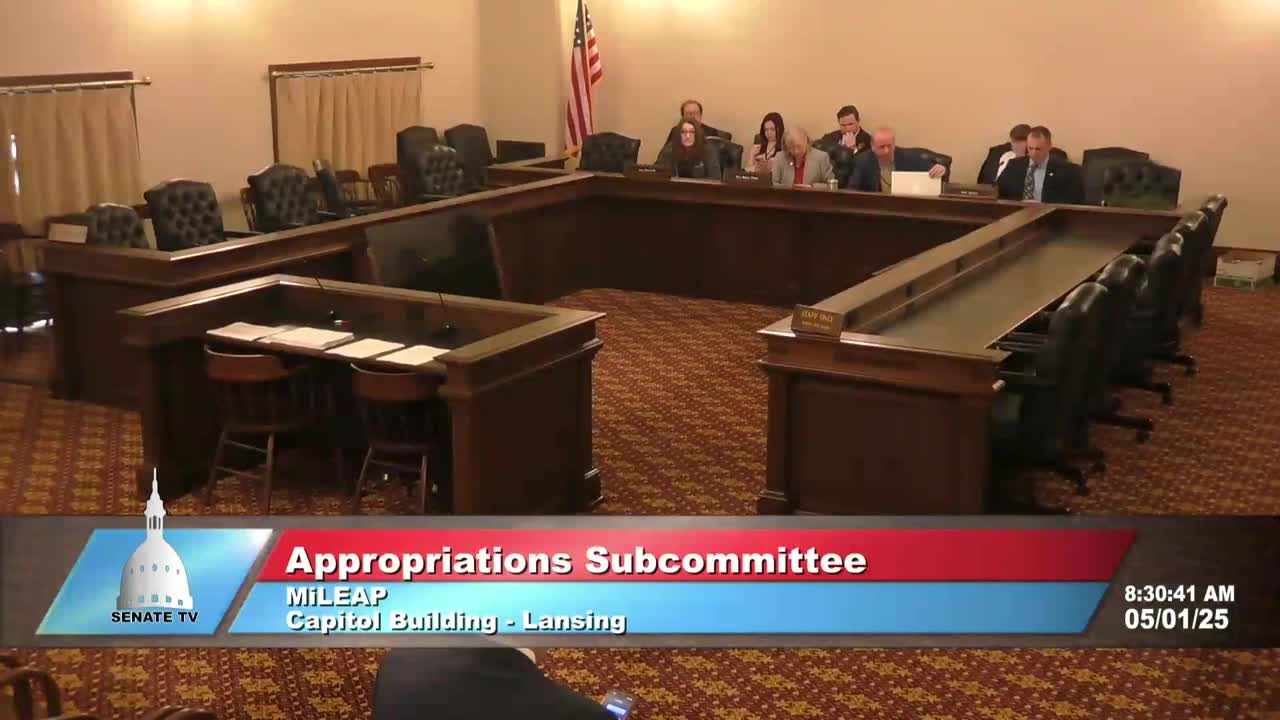Appropriations subcommittee adopts S‑1 to SB 164, backs one‑time funds to meet federal childcare requirements
Get AI-powered insights, summaries, and transcripts
Subscribe
Summary
The Appropriations Subcommittee on My LEAP voted 2‑1 to adopt the S‑1 amendment to Senate Bill 164 and to report the bill to the full committee, approving multi‑million dollar increases for childcare provider pay, Head Start expansion and higher education supports and adding one‑time state money to satisfy federal maintenance‑of‑effort rules.
The Appropriations Subcommittee on My LEAP voted 2‑1 to adopt the S‑1 amendment to Senate Bill 164 and to report the bill to the full committee, approving multiple line‑item increases that shift state general fund dollars toward childcare and higher education services.
Madam Chair of the Appropriations Subcommittee on My LEAP opened discussion by framing the committee's work as covering both postsecondary programs and early childhood care, saying the two areas “come together under economic development.” The committee clerk then reviewed the subcommittee proposal, noting a 14.3% gross increase in the program budget from $643,000,000 to $736,000,000 and a 66.2% rise in general fund support from $136,500,000 to $226,900,000.
The proposal includes several targeted increases: a $63,000,000 boost in general fund/GFGP childcare funding to fill a federal gap; a $23,000,000 increase for childcare development and care programs directed at raising pay for infant and toddler providers; $2,000,000 for re‑enrollment recruitment to help students return to college; and nearly $4,000,000 in expansion grants to help selected Head Start providers expand into full‑service childcare if they choose.
The clerk told the panel the subcommittee recommended removing a baseline dual‑enrollment line item from the department budget and replacing it with a one‑time appropriation to create a task force to assess continuing dual‑enrollment opportunities. The transcript records that replacement as a one‑time appropriation of $10,000 for a “bridal enrollment task force”; the committee discussion immediately before and after that line referenced dual enrollment, and the budget language discussed dual‑enrollment alternatives.
A substantial portion of the debate and of the recommended one‑time funding responds to federal maintenance‑of‑effort (MOE) requirements. The clerk said one MOE obligation requires the state to shift from post‑payment to pre‑payment for providers, which the department estimates will cost about $38,500,000 in the coming fiscal year to effect the transition. The clerk said a second MOE obligation concerns contracting to provide childcare in underserved areas; together those items were presented as roughly $40,000,000 in one‑time general fund support to preserve federal eligibility.
Senator Kleinfeld moved to adopt the S‑1 sub amendment; the motion was seconded and carried on a roll call vote (two yes, one no). The clerk recorded the roll as two yeas and one nay, with the yes votes carrying the S‑1 adoption and the subsequent motion to report SB 164 to the full committee. The committee also approved draft minutes from prior meetings by unanimous voice or no objection.
The subcommittee’s actions increase state general fund exposure to support childcare provider pay and to meet federal MOE rules that the clerk described as mandatory if the state wants to continue receiving certain federal funds. The subcommittee directed that the S‑1 version of SB 164 be reported to the full Appropriations Committee; the full committee will take up the bill next on the legislative calendar.
Less central to the vote but discussed in the session were programmatic efforts — reinstituting support for students who stopped out of college, pilot work to re‑enroll students, and expanding Head Start providers into broader childcare roles. Several items discussed were described in the committee as one‑time appropriations or pilot expansions rather than ongoing baseline increases.
